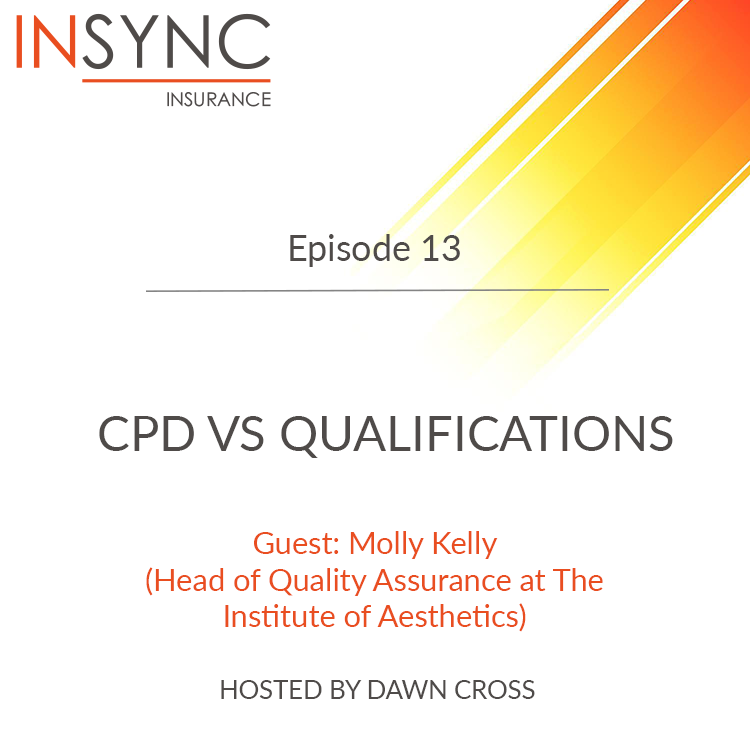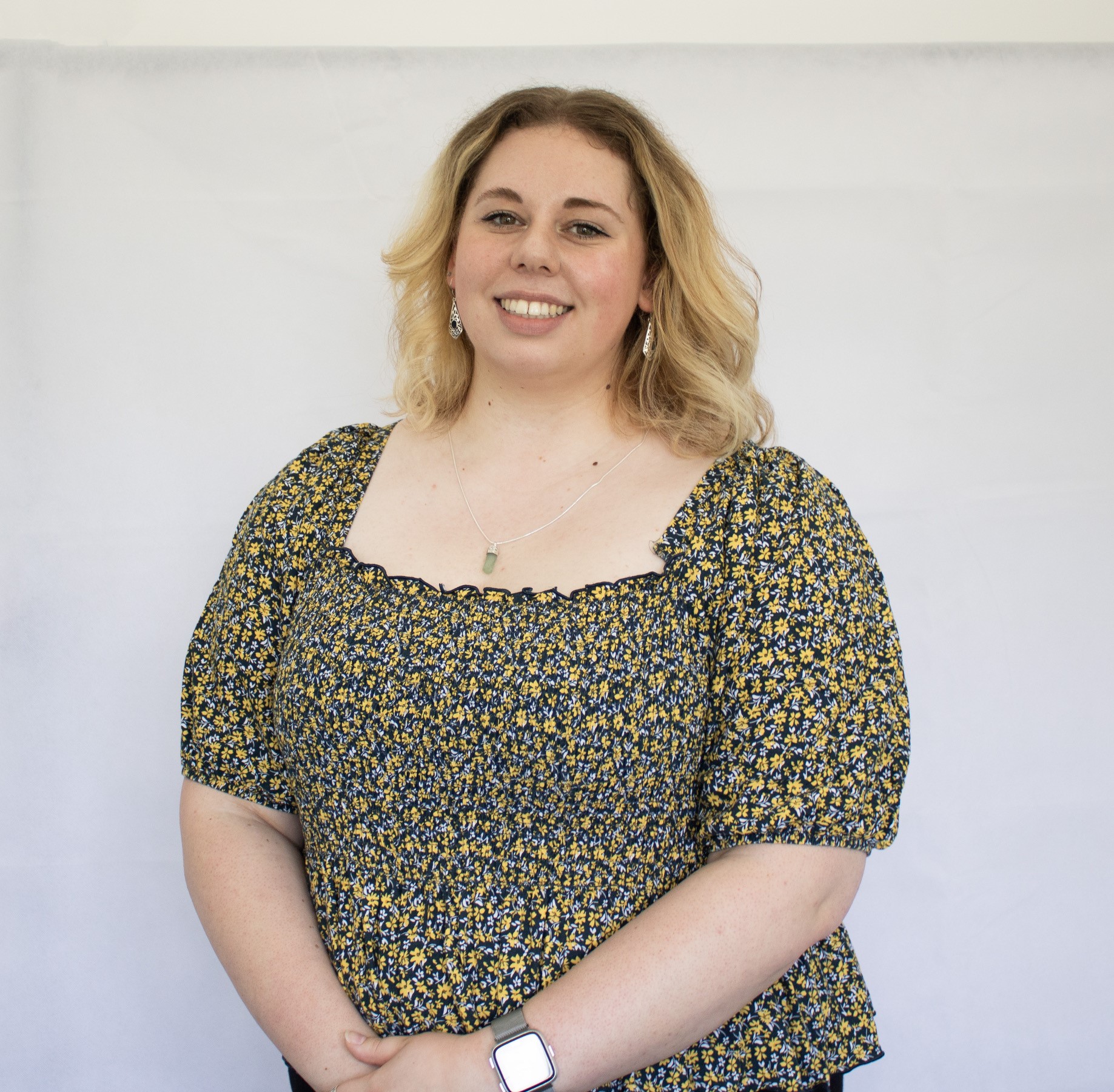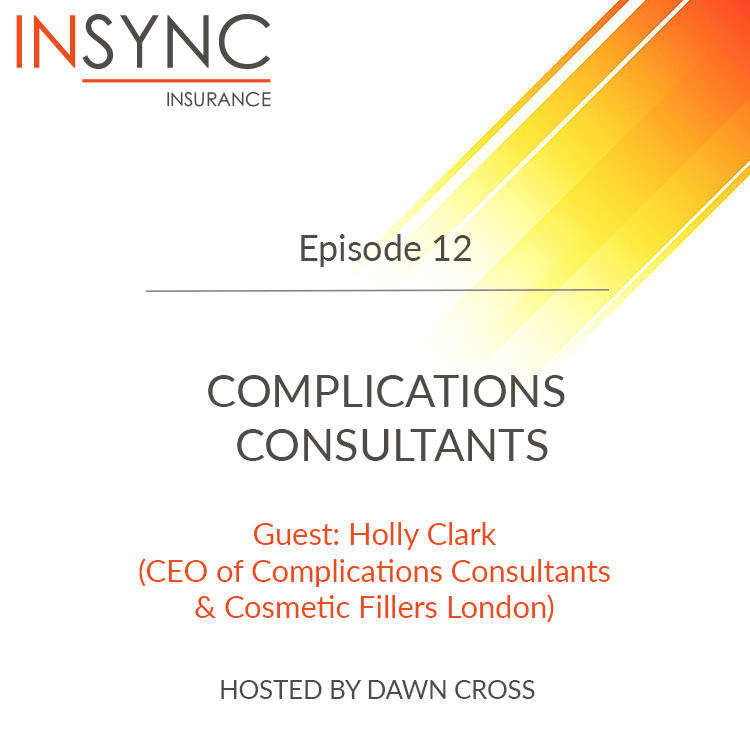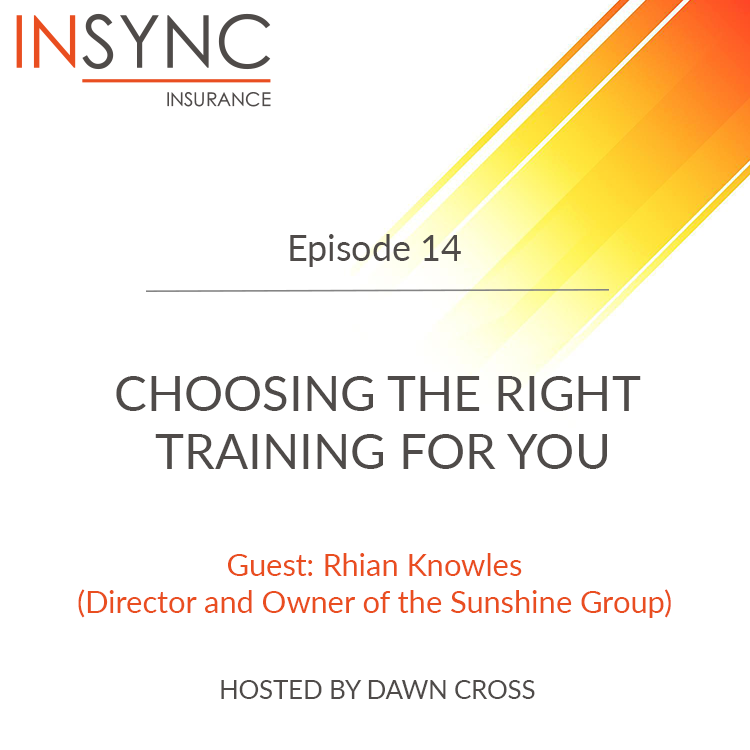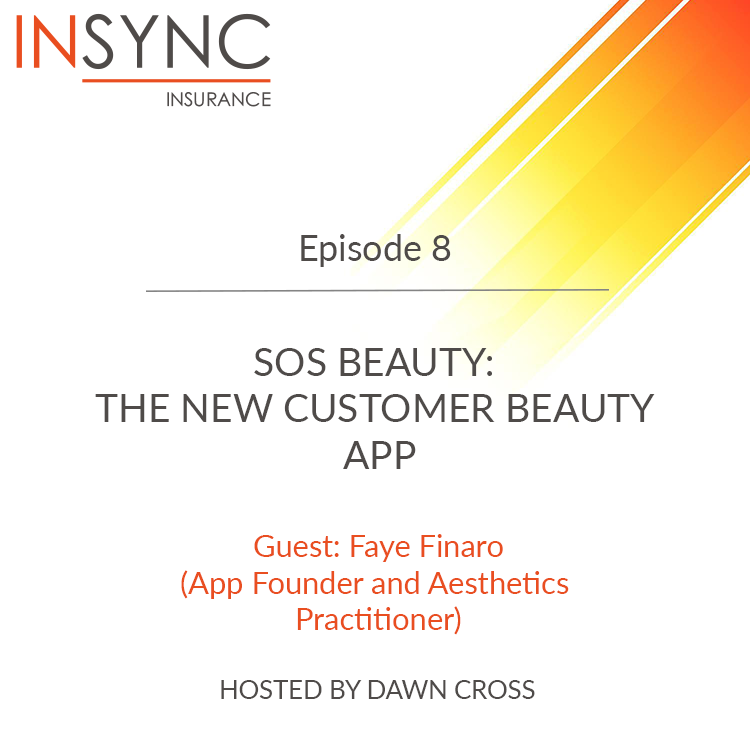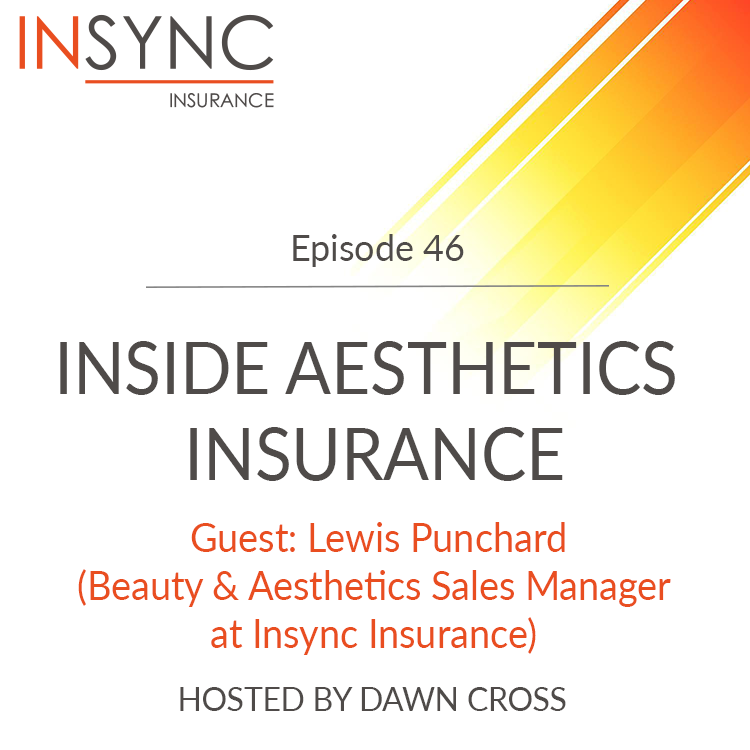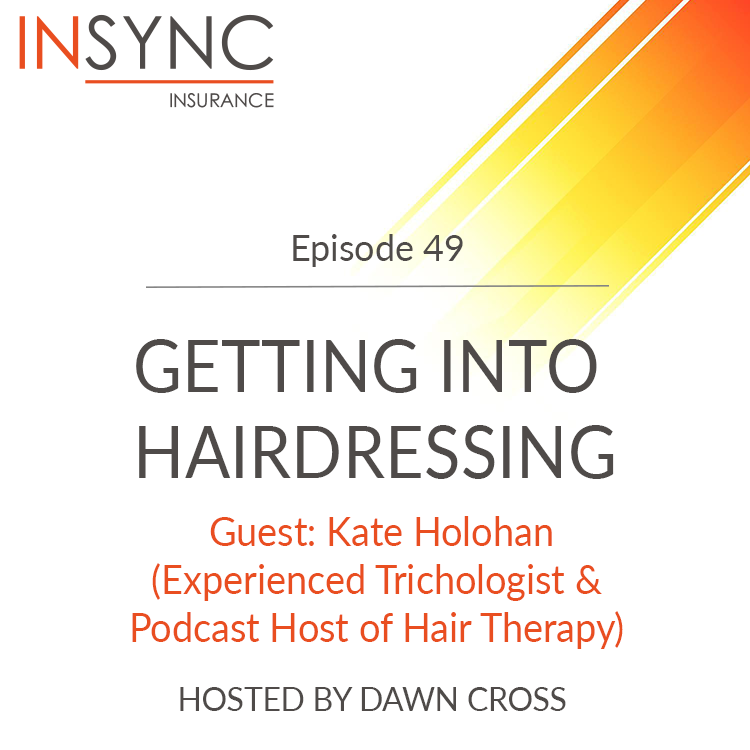Episode Transcript
Welcome to the INSYNC Insurance Podcast. I'm your host Dawn Cross, and today we'll be discussing the difference between C P D and qualification courses in beauty and aesthetics. Here today we have guest Molly Kelly, head of Quality Assurance at the Institute of Aesthetics. If you enjoy our podcast, make sure to leave a rating on your favourite podcast directory.
So, uh, could you tell me a bit more about yourself and your background?
Okay, so, um, I've been teaching since 2002. I went to Hounsfield Uni and, um, initially started teaching or I set up to um, liquor, licensing, customer service, that, that kind of thing. It was always going to be, um, business to business teaching rather than, um, the, um, you know, going into school ologies or anything like that.
Um, and I went immediately on qualifying. I went into, Training for licensing, for security which, um, was an interesting time. And, and that's kind of what, I bring to the aesthetics industry is my knowledge of the way that the government rolls out Licensing. I've been involved in the security rollout I was involved in Taxi driver rollout on licensing. And, uh, I was involved in pharmacy rollout.
So a lot of what I've done is teacher training, assessor training, and IQAtraining. So I've seen a lot of legislation being introduced and I personally think the, the rollout will be fairly quickly now that the qualifications exist.
Definitely. And that's for, um, aesthetic as well, isn't it?
Absolutely. Yeah. I mean where we're at right now is the, we have a couple of providers for level five and level seven aesthetic practice. Uh, when I say providers, I mean awarding bodies that we work with Qualifi. I've opened that up to all aesthetic practitioners.
The other one, awarding Body, VTCT, has made their level seven medic only. They're very closely aligned with J C C P and, you know, they're very strongly in that, in that medic camp. Uh, Qualifi on the other hand uh, who we are working with, they're very, very strict. And, uh, yeah, I think it's, uh, it's about to shake the industry up.
Oh, definitely. We actually did a, a previous episode with, uh, some of the head people of qualify, I think it was our third episode of the podcast. So, uh, it is been interesting to see how over a year since we've done that now, how things have been changing relatively, quite rapidly as well.
Yeah, I think when we got approval, we were one of the first. Half a dozen or so to get that approval. And, and basically the challenge that academies have got at, at the moment is that they are not qualified to deliver qualifications. So many, many, many academies have got either a CPD teaching certificate which is just an attendance only, it's CPD, it doesn't qualify them to teach qualifications.
And, um, I've currently got maybe 12, 15 academy owners that are doing their level five diploma in education and training, um, which, um, is equivalent to what we did at Uni. 20 years ago sort of thing. So there's a lot of academy owners that really need to step up their game and, and get themselves to level five teaching.
No, definitely. Uh, well, you, you've just started a really great segue into one of my questions actually, which is, what are the main differences between having a CPD certificate and an actual Qualification.
The, the beauty in aesthetics industry are really quite different. Anything I've been involved in before, um, in the, um, 90% of what I saw going on maybe four or five years ago was totally, totally all CPD.
Um, I'm quite interested in machines and technology and, and there were no qualifications when I started. Um, so we offer a C D course, um, around body sculpting and HIFU and, and that, that type of thing. Now, the difference between cPD p D and qualification is uh, C P D standard C. Basically, you write your course material, uh, as often happens, pinch somebody else's, send it to the CPD company and they approve it for CPD certification.
Um, now, um, and that, that's all it is, it, it literally, Continuing Professional Development, it's an attendance certificate.There is no real requirement for assessment and that, that's been my biggest challenge working with academy owners for them to get their head round. The fact that for a qualification, they've got to formally assess the student and there's got to be an amount of assessment.
So for example, on level four qualifications, we do four case study observations. On level five, um, we've qualified; there are 12 case study observations. On level seven, there are 20 case study observations. The, by the end of it, um, as an assessor I can say that person is competent and, and, um, and knowledgeable cuz there's written assessments as, as well.
So the other thing about qualifications that are quite different, um, it from CPD is that that qualification has a specification that is register with AQA. AQA are the Award Office of Qualifications. They're a government body, and AQA regulates awarding organizations like Qualifi, like VTCT, um, like Focus Awards that's the the other, uh, awarding organization that we, work with and a lot.
Our industry doesn't really understand the relationship between me as a training provider or any training provider, the awarding organization. And Ofqual. So Ofqual regulate the organization, the awarding organization like Qualifi regulate us, all right?
And make sure we. We have, uh, standards and the process of assessment is that my student will come in, they will do their 12 client models, 12 consultations. Um, our assessor will assess them, okay? And our internal quality assurance will observe the assessor giving feedback to the student and, and ensure that all students are treated the same, all fairly, they're all being assessed to the same standard.
And then once I've got a student completed, and we've got all their evidence in a portfolio, we claim a certificate from the awarding body, our rewarding organization, and then and only then will the external quality assurance team at the awarding organization. They will look at that evidence, agree on the evidence before certification, and if they feel there's anything missing from the portfolio that we've not evidenced, then they'll request us to do it and, and put it in.
So our end game is to make sure that everything's in, all the observations, all the evidence that the students have written. The other thing that we are required to do is plagiarism check and ensure that they've not copied and pasted answers off a website. So a Qualification is very different.
To rocking up and doing a date course and getting a CPD certification that the training provider has already printed out this morning, because they knew you were coming. But how do they know you are gonna pass? You know, how do you know that they're gonna be able to do it? And that's the main difference is with CPD, there are no real requirements for assessment. It is down to the integrity of the training provider or in this industry, they like to call themselves academies. It's purely down to that academy, that school, that training provider's integrity to make sure that their students are competent when they leave.
And as we all know, a lot of them are not, but they'll still get a certificate cuz they turned up on the day. So what we do that's a little bit different and I'm a teacher, I don't agree with fast track. That isn't actually what we offer. We offer a pathway. Now that pathway, looks like a level three qualification, a level four qualification, anatomy and physiology at level four, and then a skin needling qualification, so that they can get that needling experience.
And then they'll come back when they've got the needling experience and they'll do the Botox, and then they'll come back, then they'll do the fillers. So it's not all done in five days or six days or nine days. And basically, at that point, if a student is not deemed confident, is not deemed competent.
Then we'll do another three days and, and basically we'll bring them in. They'll work once, one on their own. There's a lot of good training providers out there, academies that, that do that. We'll work with only one or two students. But my first experience of training of filler was there were six students.
We did an Apple, Peach and, then we got a certificate. So it's very, very different. The other thing about CPD, and this is my MythBuster thing, is a lot of people say fast track and, there's level three and level four anatomy and physiology within fast track. That is a complete utter crock of rubbish.
All right? Cause levels do not apply within a PD course, because they're not assessing it. How can someone say that they are level three then? Level four anatomy and physiology. If it's not been assessed . So we do a level four and it's quite regulated. It's certified through focus awards or another awarding organization, and we do that within our pathway.
And in total, my average student is from signing up, doing a level three in anaphylaxis to walking out the door with advanced Botox and fillers. In eight months, nine months. Okay. The other thing is about, I mean, I've been teaching for a long time, so I understand how people learn, and if you get information on 20 different things, B12, anatomy, physiology, vitamin D, vit drips, d cleaning microneedling, chemical peels, Botox, fillers in five days, your brain can't process it.
And it's as simple as that. So small sized chunks is the way forward. So I'm pretty excited for Level five and seven being rolled out properly.
That's brilliant. And obviously when applying for insurance, it varies to individual circumstances, so we can't always guarantee it, but you must also meet certain prerequisites, like having been on an UK accredited course, having a level five or seven qualification is a great advantage, but it's not a requirement for insurance.
And the other thing is, I mean, I do CPD certifying my Botox and my fillers, but I do that up to advance because I know that my students, I'm basically preparing them to go on to level seven. All right, so level seven would be very, very difficult to do with no prior Injectable experience.
So there is a place for it still in the middle of this process. And, and that's basically what my students who are currently studying level five and seven have been through is they've done a level three, they've done a level four, they're CPD certified inMesotherapy, fat dissolving skin boosters. Then they've done, finished a level four skin needling when they've got insured for that.
And then they've moved on and done the CPD Botox and fillers. And when they come to do level seven, they'll have had lots of practice. So I don't think the academic part of level seven is as scary because they've been prepared for that with the written part of level five. So I, I honestly think aesthetic practitioners, regardless of the background, will find level five more challenging only because they've not had at that academic level before unless, of course, they've done a different degree,
But you know, we've currently we've got nurses, we've got people that have come from a beauty aesthetics background, we've got people that have come from a teaching background, like me, and we've even got doctors and pharmacists that are doing teaching quals right now with us, and they're also doing the level seven, although technically they don't need to cause there are already level seven, but if they're gonna teach it, they need to understand the content of qualification. So that's their way of doing best practice.
That's brilliant. Obviously, you've mentioned a lot about the courses and what you've been up to yourself. Uh, so what kind of courses then does the Institute of Aesthetics offer that could be useful for our audience to know or possibly sign up to? Okay, so my background is teacher training. So we offer level three award in education and training.
We offer level three assessing vocational achievement that there you, your core teaching quals. There is a level four, but you can miss that out if you go in onto level five, cuz there's a lot of duplication in four and five. So level five diploma in education and training is a big qualification. It's quite challenging.
More challenging than the level five aesthetics in, in my opinion, I've done a lot of first aid training and health and safety stuff. So the first qualification that my students do is a level three in immediate management of anaphylaxis. We feel that's important because the first thing that they are doing is introduce products into people's skins.
And if it'll be products that they, they may not have had before. So anaphylaxis is a real risk. Then we've got a whole suite of level four qualifications for chemical peels, microneedling, micro-pigmentation, and semi-permanent makeup. And we then go onto level five and level seven, as well as the CPD stuff that we kind of mix in between it all.
But essentially the important thing for anybody new coming into the industry is that if you're brand new, you can't go on to level 5 without having a level three and level four, you can't go onto level five if your CPR and immediate management of anaphylaxis is not in date. So my particular expertise is preparing people for licensing and having seen quite a few other industries being licensed.
And I'm also seeing right now the, for level four stuff like micro-pigmentation and laser in particular, a lot of councils are not, are no longer accepting CPD certificates. So we are quite busy with those level fours. As well, but they've got a four, they can go onto five, and if they've got five they can go onto seven.
There's rules within Ofqual regulated qualifications as well that are not just key to aesthetics. There are entry requirements to certain qualifications, and that's the thing that anyone knew right now needs to understand, what are those entry requirements? And make sure you go with a training provider that is not gonna leave you out in the cold that in you meeting in those requirements.
And there's some great providers out there, quite a few qualified centers now, and I can say of all the awarding bodies that I've worked with, they are the strict; premises inspections, you know, not just the quality of the teaching, but the environment and, and every, everything else as well.
No, they're very, very good and we're so happy to partner with them as well from Insync Insurance. Cause we know that they, they'd leave no stone unturned essentially.
As a training provider, you always wanna do the absolute best, but as I say, more scrutiny than I've experienced in 20 years of teaching from Qualify. But that's a good thing. That's what the industry needs. I feel it's insurers like yourself need, because you will know without shadow of doubt. If someone has a level five or a level seven qualification, they've been observed doing that treatment 12 times or 20 times.
And that is what we need to know is that we're going somewhere that has got competent injectors, you know, so I'm excited about the future of the industry. I think there will be quite a few that fall off you, you know, currently, um, you know, doing backstreet treatments, mobile treatments and, and that sort of thing and I think we will quite literally get to the point where the customer is going for quality rather than price.
No, definitely. Uh, so is there anything else you'd like to add before we wrap up this episode? Um, no. Oh, not really. I've done a blog about CPDs and Qualifications. And if anybody wants and wants any more information, then we can attach that link, or they can ring me and ask me for it.
We'll include the links, especially a link to your website for the institute in the podcast description as well. So if anyone is interested, they can check it out after listening. I better put my Insync partner badge on there than Sprint. Well, thank so much for coming on today.
Oh, very welcome. Great pick brains and I hope everyone else, uh, has really enjoyed the information you've been able to give us today. Cool. Thank you.
Thank you to my guest today, Molly Kelly for talking about the difference between CPD and qualification courses. The Institute of Aesthetics offer both types of courses, so to learn more, please visit www.ioauk.com. I have been your host on Cross, and tune in soon for another.
Insync one of the UK's fastest growing insurance providers offering comprehensive cover for ESS and the self-employed across the uk.
Our expert team can tailor your insurance to meet your individual business needs and compare prices from our Lloyds of London approved partners. We offer a five star service and have been FIFO Platinum trusted winners four years in a row.
